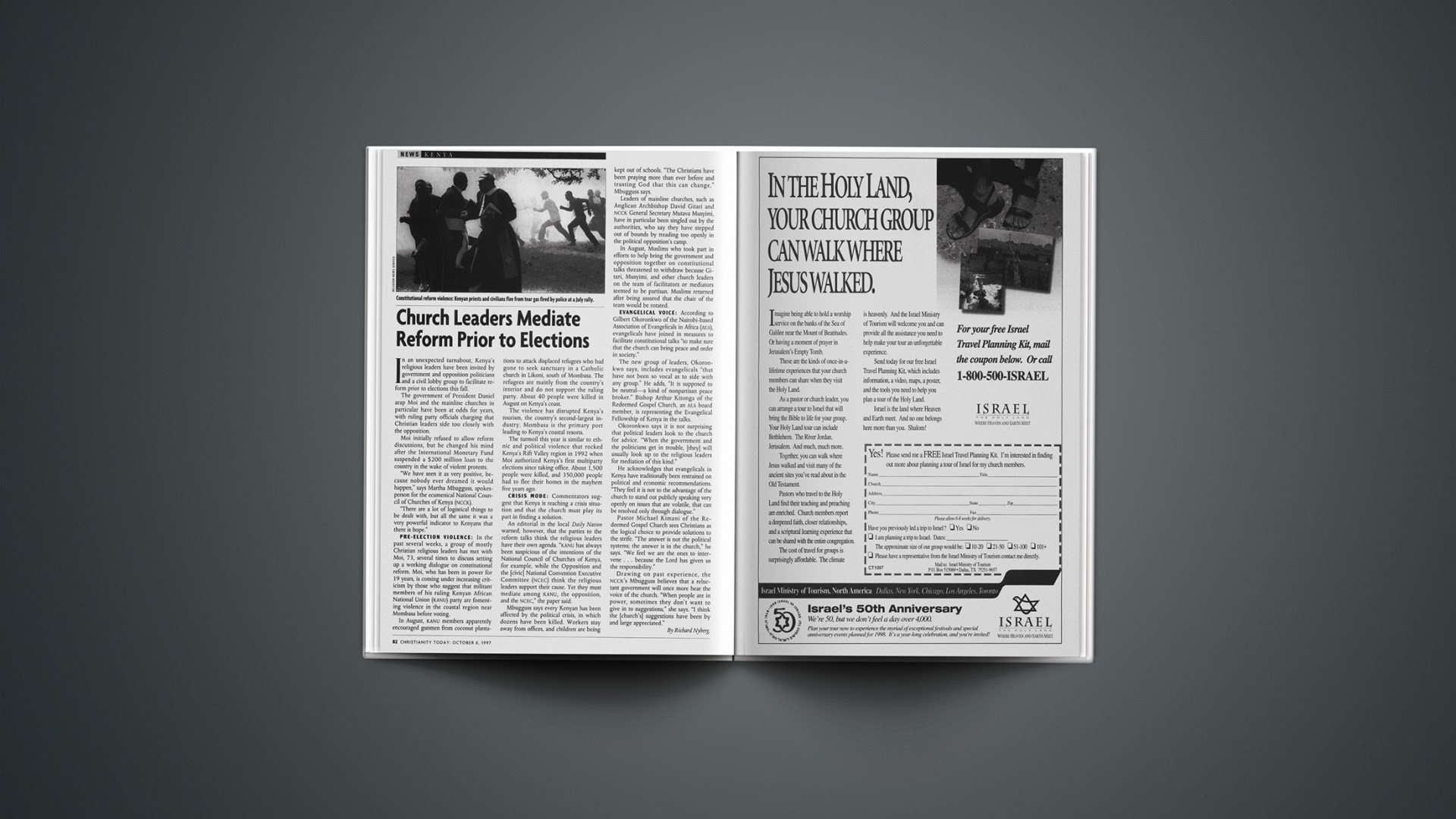In an unexpected turnabout, Kenya’s religious leaders have been invited by government and opposition politicians and a civil lobby group to facilitate reform prior to elections this fall.
The government of President Daniel arap Moi and the mainline churches in particular have been at odds for years, with ruling party officials charging that Christian leaders side too closely with the opposition.
Moi initially refused to allow reform discussions, but he changed his mind after the International Monetary Fund suspended a $200 million loan to the country in the wake of violent protests.
“We have seen it as very positive, because nobody ever dreamed it would happen,” says Martha Mbugguss, spokesperson for the ecumenical National Council of Churches of Kenya (NCCK).
“There are a lot of logistical things to be dealt with, but all the same it was a very powerful indicator to Kenyans that there is hope.”
PRE-ELECTION VIOLENCE: In the past several weeks, a group of mostly Christian religious leaders has met with Moi, 73, several times to discuss setting up a working dialogue on constitutional reform. Moi, who has been in power for 19 years, is coming under increasing criticism by those who suggest that militant members of his ruling Kenyan African National Union (KANU) party are fomenting violence in the coastal region near Mombasa before voting.
In August, KANU members apparently encouraged gunmen from coconut plantations to attack displaced refugees who had gone to seek sanctuary in a Catholic church in Likoni, south of Mombasa. The refugees are mainly from the country’s interior and do not support the ruling party. About 40 people were killed in August on Kenya’s coast.
The violence has disrupted Kenya’s tourism, the country’s second-largest industry. Mombasa is the primary port leading to Kenya’s coastal resorts.
The turmoil this year is similar to ethnic and political violence that rocked Kenya’s Rift Valley region in 1992 when Moi authorized Kenya’s first multiparty elections since taking office. About 1,500 people were killed, and 350,000 people had to flee their homes in the mayhem five years ago.
CRISIS MODE: Commentators suggest that Kenya is reaching a crisis situation and that the church must play its part in finding a solution.
An editorial in the local Daily Nation warned, however, that the parties to the reform talks think the religious leaders have their own agenda. “KANU has always been suspicious of the intentions of the National Council of Churches of Kenya, for example, while the Opposition and the [civic] National Convention Executive Committee (NCEC) think the religious leaders support their cause. Yet they must mediate among KANU, the opposition, and the NCEC,” the paper said.
Mbugguss says every Kenyan has been affected by the political crisis, in which dozens have been killed. Workers stay away from offices, and children are being kept out of schools. “The Christians have been praying more than ever before and trusting God that this can change,” Mbugguss says.
Leaders of mainline churches, such as Anglican Archbishop David Gitari and NCCK General Secretary Mutava Musyimi, have in particular been singled out by the authorities, who say they have stepped out of bounds by treading too openly in the political opposition’s camp.
In August, Muslims who took part in efforts to help bring the government and opposition together on constitutional talks threatened to withdraw because Gitari, Musyimi, and other church leaders on the team of facilitators or mediators seemed to be partisan. Muslims returned after being assured that the chair of the team would be rotated.
EVANGELICAL VOICE: According to Gilbert Okoronkwo of the Nairobi-based Association of Evangelicals in Africa (AEA), evangelicals have joined in measures to facilitate constitutional talks “to make sure that the church can bring peace and order in society.”
The new group of leaders, Okoronkwo says, includes evangelicals “that have not been so vocal as to side with any group.” He adds, “It is supposed to be neutral—a kind of nonpartisan peace broker.” Bishop Arthur Kitonga of the Redeemed Gospel Church, an AEA board member, is representing the Evangelical Fellowship of Kenya in the talks.
Okoronkwo says it is not surprising that political leaders look to the church for advice. “When the government and the politicians get in trouble, [they] will usually look up to the religious leaders for mediation of this kind.”
He acknowledges that evangelicals in Kenya have traditionally been restrained on political and economic recommendations. “They feel it is not to the advantage of the church to stand out publicly speaking very openly on issues that are volatile, that can be resolved only through dialogue.”
Pastor Michael Kimani of the Redeemed Gospel Church sees Christians as the logical choice to provide solutions to the strife. “The answer is not the political systems; the answer is in the church,” he says. “We feel we are the ones to intervene … because the Lord has given us the responsibility.”
Drawing on past experience, the NCCK’s Mbugguss believes that a reluctant government will once more hear the voice of the church. “When people are in power, sometimes they don’t want to give in to suggestions,” she says. “I think the [church’s] suggestions have been by and large appreciated.”
Copyright © 1997 Christianity Today. Click for reprint information.










